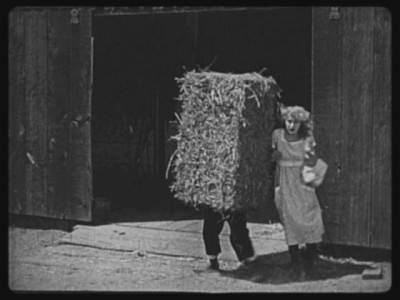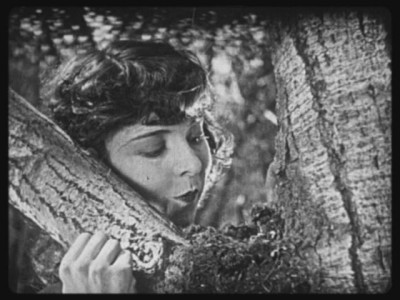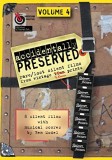| Reviews & Columns |
|
Reviews DVD TV on DVD Blu-ray 4K UHD International DVDs In Theaters Reviews by Studio Video Games Features Collector Series DVDs Easter Egg Database Interviews DVD Talk Radio Feature Articles Columns Anime Talk DVD Savant Horror DVDs The M.O.D. Squad Art House HD Talk Silent DVD
|
DVD Talk Forum |
|
|
| Resources |
|
DVD Price Search Customer Service #'s RCE Info Links |
|
Columns
|
|
|
Accidentally Preserved Volume 4
Undercrank Productions // Unrated // November 15, 2016
List Price: $19.95 [Buy now and save at Amazon]
The Shorts:
Undercrank Productions has gone back to the vaults once again and has emerged with Accidentally Preserved Volume Four. The series presents movies that only exist thanks to the home market, movies that were sold (or rented) directly to consumers on smaller (and therefore less expensive) gauge film. Sometimes these reduction prints are the only versions that survive, with no examples to be found in film archives around the world. This time the disc presents eight movies that only exist on 9.5mm prints. While these offer less resolution that 16mm the images are still clear and all of the films presented here look decent.
While the 9.5mm film was never a leading format in the US, they were very popular in Europe and England. Since three strips of 9.5mm could be derived from a single reel of 35mm film, the larger gauge film was used to imprint three side-by-side images, processed, and then cut to save on costs. The perforations were added in between the frames rather than on the side.
The shorts included in this collection are:
Nonsense (1920) - this is the type of silent short where they come up with a bunch of gags and drape a plot. Two farm hands are vying for the attention of a beautiful young lady and start to fight. (One of them even encases his opponent in a bale of hay, pours gasoline on it, and then sets the whole thing on fire. They're serious about this gal.) But it's all for naught: The local crook, an older, heavyset man, manages to sweet talk the lady into running off with him by promising her a lavish life of luxury. The reality is quite different though, and her two suitors take off to save her from a life of being a dance hall girl. There's something about an inheritance too, but they seem to have forgotten about that by the end of the picture.
This is a typical silent comedy short, with some decent gags and a few laughs. The one part the interested me the most was a fairly standard bit that was filmed incorrectly. At one point one of the two rivals is at the top of a ladder and his opponent pushes it over. The man on the ladder lands on the roof of a nearby building. This is a gag that's in a lot of shorts, but they always undercrank the camera so that the action looks faster when projected. The cameraman forgot to do that in this case, and you can see the man and ladder slowly being lowered onto the roof. It was a treat to see this standard joke running in real time.
The Ninety and Nine (1922) - I was excited to discover that there was an early Colleen Moore film on this disc. I'm a big fan of the actress and a lot of her work is lost. Unfortunately this really isn't enough to evaluate her performance since this version cuts the seven reels down to one, mainly preserving the exciting last-minute rescue at the end. There is some introductory text screens that explain the plot (it's impossible understand in this abridgement without them) but this shortened version lacks the emotional impact of the rescue since viewers don't really know who any of the characters are. The full version of the movie still exists, and this would be an interesting extra if it that were to ever be released to home video.
Meet Father (1924) - This one-reel comedy stars Bobby Ray, a one-time child actor who was able to continue working in front of the camera as an adult. Here he plays a bookish man who has to win the approval of his girlfriend's father before they can be married. The father has his eye on a boxing champion as the perfect son-in-law, so Bobby tries to learn the art of self-defense from a book. It doesn't go as well as he was hoping.
The Wages of Tin (1925) - an amusing comedy starring Glenn Tryon. Another man who wants to impress his girl, Glenn decides to rent an automobile and take the young lady for a ride. So, like Bobby Ray in the previous short, he gets a book and tries to figure out how to operate a car. There's a great scene where he arrives at the rental place and the proprietor, realizing that Glenn has never driven in his life, has one of his assistants give Glenn a two-minute lesson before turning him loose on the streets. A nice one-reeler.
The Tides of Passion (1925) - Mae Marsh stars in this two-reel edition a lost seven-reel feature. While the plot is more or less intact, it can be a bit hard to follow in places. The story revolves around a soldier who gets shipped off to India, leaving his wife (Marsh) at home. While away the man starts fooling around with women and gets into all sorts of trouble. It's a nice drama, and I imagine the full version has more impact. This was Mae Marsh's last silent film.
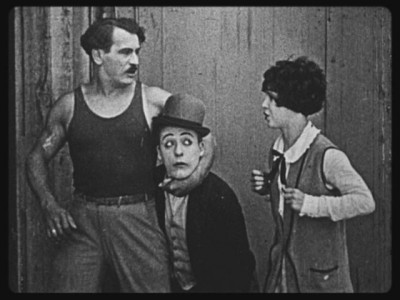
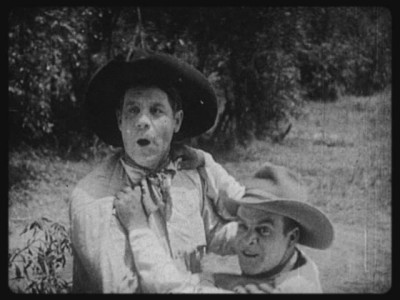
A Man's Size Pet (1926) - This two-reel comedy has a western setting... something you don't see too often. A pair of ranch hands compete for the attention of the same girl, while trying to avoid her pet... a black bear.
Walter's Paying Policy (1926) - A comedian by the name of Walter Forde stars in this British two-reel comedy that can't quite avoid some of the more common pitfalls that the best silent shorts sidestep. Walter and his coworker, Paderewski, are employed by the Busy Bee Insurance Co. (motto: You will not be stung by Busy Bee). When the boss reads that a local businessman, Max Gruff, has purchased "the world's most famous vase," he decrees that whoever can get the policy to insure the antique will get a promotion. Walter and Paderewski scamper off to Gruff's office, but he does not believe in having insurance at all, so it's a bit of a difficult sale.
The reason this film isn't more successful is because there's little internal logic, it's just a series of gags. In the first reel Walter and Paderewski spend all of their time trying to get into Gruff's office. They use some creative and cleaver techniques, but once they get in (and they do several times) the same thing happens: the salesman presents his business card, Gruff tears it up, and throws the man out. Rinse and repeat. The third or fourth time this happens you start to wonder why they don't realize that handing him a card just won't work. Later the story shift's to Gruff's house, where the two insurance agents gain access by dressing up as a window washer and painter. Where do they get the uniforms? They are literally lying on the ground outside the house. Why are they there? Who knows? In a Lloyd or Keaton comedy, and especially Chaplin's, there would be a reason for the uniforms to be there and the comedians would have a plan once they got to meet Gruff. They were tightly scripted, something this (and in all honestly, a lot of silent and sound shorts) was not.
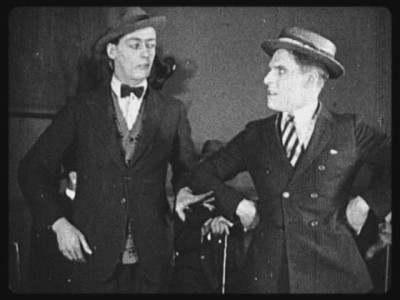
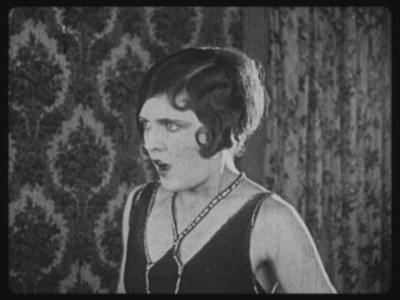
'Morning, Judge (1926) - the set ends on a high note with this madcap comedy from the "Carrie of the Chorus" series starring former Ziegfeld girl Peggy Shaw. It also features comedians Flora Finch and Joe Burke and was directed by none other than Dave Fleischer (of Koko the Clown and Betty Boop fame). In this tale a local theater is shut down by a temperance group, and one of the stage hands invites the chorus girls to stay at his father's house until it can reopen. After all, his mother (the leader of the group that shut down the theater) is going to be away at a national convention. Unfortunately the mother returns early to find her husband with a house full of scantily clad woman, and a wanted criminal breaks in after hearing that the group's funds are stored in the same house. Chaos ensues. The scenes at the end with the volunteer fire department, obviously patterned after the Keystone Cops are hilarious.
Audio:
The audio accompanying these films is just as good as the soundtrack on the first three volumes. If you've ever seen a silent film with random music played over it (as public domain publishers often do) you'll know how much a good score adds to the viewing experience. Ben Model provides the music for these shorts, from scores he composed, and they are great. These tracks fit the subject matter and the music (preformed on both organ and piano) really helps to bring the films to life. There are no dropouts or other audio defects.
Video:
These are exceedingly rare movies, some of them from the only print in existence, but the image quality is generally good. Since these are all sourced from 9.5mm film, the unrestored picture is not as sharp or detailed as even 16mm, to say nothing of 35mm. The contrast varies but is overall fine but there is some print damage in the form of scratches and dirt on most of the films. Even so, these movies are not hard on the eyes.
Extras:
None.
Final Thoughts:
While I have to admit that this volume was a bit more hit-or-miss than the previous installments, Accidentally Preserved Volume Four is another great collection of rare and exceedingly hard to find shorts. There are some real gems in this collection and it is well worth checking out. Recommended.
Undercrank Productions has gone back to the vaults once again and has emerged with Accidentally Preserved Volume Four. The series presents movies that only exist thanks to the home market, movies that were sold (or rented) directly to consumers on smaller (and therefore less expensive) gauge film. Sometimes these reduction prints are the only versions that survive, with no examples to be found in film archives around the world. This time the disc presents eight movies that only exist on 9.5mm prints. While these offer less resolution that 16mm the images are still clear and all of the films presented here look decent.
While the 9.5mm film was never a leading format in the US, they were very popular in Europe and England. Since three strips of 9.5mm could be derived from a single reel of 35mm film, the larger gauge film was used to imprint three side-by-side images, processed, and then cut to save on costs. The perforations were added in between the frames rather than on the side.
The shorts included in this collection are:
Nonsense (1920) - this is the type of silent short where they come up with a bunch of gags and drape a plot. Two farm hands are vying for the attention of a beautiful young lady and start to fight. (One of them even encases his opponent in a bale of hay, pours gasoline on it, and then sets the whole thing on fire. They're serious about this gal.) But it's all for naught: The local crook, an older, heavyset man, manages to sweet talk the lady into running off with him by promising her a lavish life of luxury. The reality is quite different though, and her two suitors take off to save her from a life of being a dance hall girl. There's something about an inheritance too, but they seem to have forgotten about that by the end of the picture.
This is a typical silent comedy short, with some decent gags and a few laughs. The one part the interested me the most was a fairly standard bit that was filmed incorrectly. At one point one of the two rivals is at the top of a ladder and his opponent pushes it over. The man on the ladder lands on the roof of a nearby building. This is a gag that's in a lot of shorts, but they always undercrank the camera so that the action looks faster when projected. The cameraman forgot to do that in this case, and you can see the man and ladder slowly being lowered onto the roof. It was a treat to see this standard joke running in real time.
Meet Father (1924) - This one-reel comedy stars Bobby Ray, a one-time child actor who was able to continue working in front of the camera as an adult. Here he plays a bookish man who has to win the approval of his girlfriend's father before they can be married. The father has his eye on a boxing champion as the perfect son-in-law, so Bobby tries to learn the art of self-defense from a book. It doesn't go as well as he was hoping.
The Wages of Tin (1925) - an amusing comedy starring Glenn Tryon. Another man who wants to impress his girl, Glenn decides to rent an automobile and take the young lady for a ride. So, like Bobby Ray in the previous short, he gets a book and tries to figure out how to operate a car. There's a great scene where he arrives at the rental place and the proprietor, realizing that Glenn has never driven in his life, has one of his assistants give Glenn a two-minute lesson before turning him loose on the streets. A nice one-reeler.
The Tides of Passion (1925) - Mae Marsh stars in this two-reel edition a lost seven-reel feature. While the plot is more or less intact, it can be a bit hard to follow in places. The story revolves around a soldier who gets shipped off to India, leaving his wife (Marsh) at home. While away the man starts fooling around with women and gets into all sorts of trouble. It's a nice drama, and I imagine the full version has more impact. This was Mae Marsh's last silent film.


A Man's Size Pet (1926) - This two-reel comedy has a western setting... something you don't see too often. A pair of ranch hands compete for the attention of the same girl, while trying to avoid her pet... a black bear.
Walter's Paying Policy (1926) - A comedian by the name of Walter Forde stars in this British two-reel comedy that can't quite avoid some of the more common pitfalls that the best silent shorts sidestep. Walter and his coworker, Paderewski, are employed by the Busy Bee Insurance Co. (motto: You will not be stung by Busy Bee). When the boss reads that a local businessman, Max Gruff, has purchased "the world's most famous vase," he decrees that whoever can get the policy to insure the antique will get a promotion. Walter and Paderewski scamper off to Gruff's office, but he does not believe in having insurance at all, so it's a bit of a difficult sale.
The reason this film isn't more successful is because there's little internal logic, it's just a series of gags. In the first reel Walter and Paderewski spend all of their time trying to get into Gruff's office. They use some creative and cleaver techniques, but once they get in (and they do several times) the same thing happens: the salesman presents his business card, Gruff tears it up, and throws the man out. Rinse and repeat. The third or fourth time this happens you start to wonder why they don't realize that handing him a card just won't work. Later the story shift's to Gruff's house, where the two insurance agents gain access by dressing up as a window washer and painter. Where do they get the uniforms? They are literally lying on the ground outside the house. Why are they there? Who knows? In a Lloyd or Keaton comedy, and especially Chaplin's, there would be a reason for the uniforms to be there and the comedians would have a plan once they got to meet Gruff. They were tightly scripted, something this (and in all honestly, a lot of silent and sound shorts) was not.


'Morning, Judge (1926) - the set ends on a high note with this madcap comedy from the "Carrie of the Chorus" series starring former Ziegfeld girl Peggy Shaw. It also features comedians Flora Finch and Joe Burke and was directed by none other than Dave Fleischer (of Koko the Clown and Betty Boop fame). In this tale a local theater is shut down by a temperance group, and one of the stage hands invites the chorus girls to stay at his father's house until it can reopen. After all, his mother (the leader of the group that shut down the theater) is going to be away at a national convention. Unfortunately the mother returns early to find her husband with a house full of scantily clad woman, and a wanted criminal breaks in after hearing that the group's funds are stored in the same house. Chaos ensues. The scenes at the end with the volunteer fire department, obviously patterned after the Keystone Cops are hilarious.
The DVD:
Audio:
The audio accompanying these films is just as good as the soundtrack on the first three volumes. If you've ever seen a silent film with random music played over it (as public domain publishers often do) you'll know how much a good score adds to the viewing experience. Ben Model provides the music for these shorts, from scores he composed, and they are great. These tracks fit the subject matter and the music (preformed on both organ and piano) really helps to bring the films to life. There are no dropouts or other audio defects.
Video:
These are exceedingly rare movies, some of them from the only print in existence, but the image quality is generally good. Since these are all sourced from 9.5mm film, the unrestored picture is not as sharp or detailed as even 16mm, to say nothing of 35mm. The contrast varies but is overall fine but there is some print damage in the form of scratches and dirt on most of the films. Even so, these movies are not hard on the eyes.
Extras:
None.
Final Thoughts:
While I have to admit that this volume was a bit more hit-or-miss than the previous installments, Accidentally Preserved Volume Four is another great collection of rare and exceedingly hard to find shorts. There are some real gems in this collection and it is well worth checking out. Recommended.
|
| Popular Reviews |
| Sponsored Links |
|
|
| Sponsored Links |
|
|
| Release List | Reviews | Shop | Newsletter | Forum | DVD Giveaways | Blu-Ray | Advertise |
|
Copyright 2024 DVDTalk.com All Rights Reserved. Legal Info, Privacy Policy, Terms of Use,
Manage Preferences,
Your Privacy Choices | |||||||









